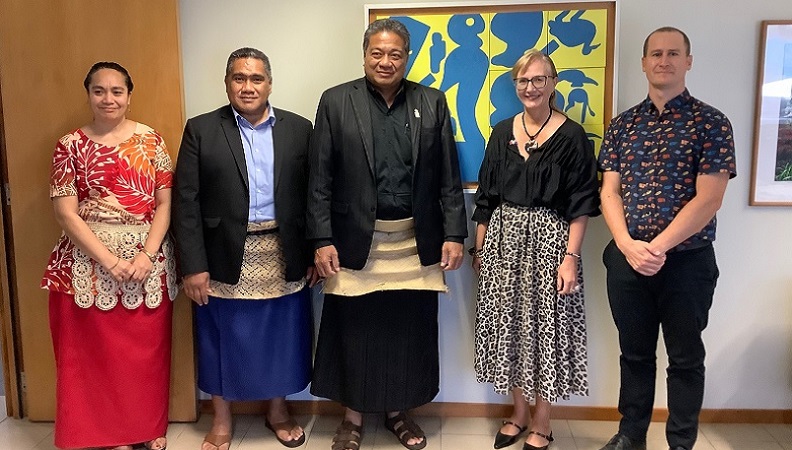
The Minister for MEIDECC Poasi Tei and the New Zealand High Commissioner to Tonga, Tiffany Babington met to officially mark NZ’s generous support of a NZ$591,000 project for the development of Tonga’s national long-term low emission development strategy.
The Department of Climate Change under Ministry of Meteorology, Energy, Information, Disaster Management, Environment, Climate Change and Communication (MEIDECC) is taking the lead in developing this national long-term low emissions development strategy (LT-LEDS) project, in partnership with ClimateWorks Australia (CWA), Global Green Growth Institute (GGGI) and Relative Creative.
Minister Tei said, “The LT-LEDS will articulate a long-term vision and direction for the future of Tonga across all sectors in a low-carbon world, and in a changing climate.”
The process of developing the LT-LEDS will strengthen and extend existing dialogue and governance processes, building capability within Tonga’s leadership for long-term thinking across different sectors. It is intended that the LT-LEDS will provide a vision and framework for other sectoral and national plans to align with, over time.
At the same time, thes project will further support the development of Tonga’s enhanced Nationally Determined Contributions (NDC), to be submitted to the United Nations Framework Convention on Climate Change (UNFCCC) by December 2020. Developing the LT-LEDS and the NDC together will ensure alignment between the long-term vision and pathways, and the short term planning and investments.
“The LT-LEDS will also provide a framework for other plans and policies to align with, including: the Tonga Climate Change Policy, Joint national Action Plan on Climate Change and Disaster Risk Management (JNAP 2), Tonga Energy Road map (TERM), and Tonga’s Nationally Determined Contribution (NDC)” CEO of MEIDECC, Paula Ma’u said.
New Zealand is helping Pacific Island Countries, including Tonga, adapt to and mitigate the effects of climate change, improve their social, economic and environmental resilience, and lead their climate change responses by supporting strengthened capacity for effective low-emission, climate resilient planning.
“Low-emissions, climate-resilient planning expands the mitigation and adaptation impacts of our actions and investments by supporting the development of climate change policies, plans and investment road maps across a wide range of sectors – such as electricity, transport, agriculture, tourism, and urban planning,” Ms Babington said.
Now with the support of the New Zealand Ministry of Foreign and Trade (MFAT) in funding the second phase of developing Tonga’s LT-LEDS, the Government of the Kingdom of Tonga will prepare the LT-LEDS to be communicated to the UNFCCC and launched at COP26 in Glasgow in November 2021.
Photo supplied
